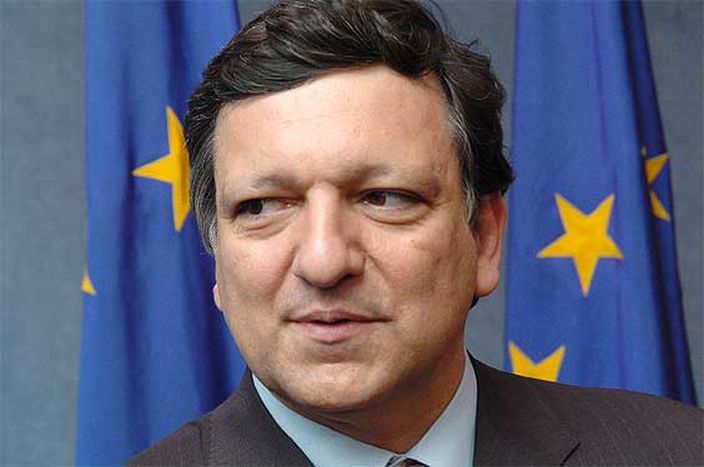
José Manuel Barroso on the financial crisis: 'national borders mean little'
Published on
Pulling together; the official word from the president of the European commission, which hit Europe's national dailys on 2 October
 The speed and extent of the financial crisis which started in the US just over a year ago has sent shockwaves round the world. No-one is immune. We have seen some of the giants of the financial world suddenly facing bankruptcy. For many households and businesses the future has suddenly become much tougher. There will be time for post mortems later. What matters now is that political
The speed and extent of the financial crisis which started in the US just over a year ago has sent shockwaves round the world. No-one is immune. We have seen some of the giants of the financial world suddenly facing bankruptcy. For many households and businesses the future has suddenly become much tougher. There will be time for post mortems later. What matters now is that political
leaders give the right responses – to tackle the immediate crisis, protect citizens’ savings and ensure businesses have sufficient credit for their needs, and then to put in place a better governance system for the future.
The past year has seen European Union action on many levels to address the problems of the financial system – by national governments, by the European central bank, by the European bommission. We are improving transparency, supervision and standards. But Europe's response is still largely national in nature. Although there are more than 8,000 banks in the EU, two thirds of total EU bank assets are held in only 44 cross-border banks. Many operate in at least six different EU member states. This is the single market at work: but cross border banks have to deal with different systems of supervision in each member state.
The last few days have showed that these key players can come together and confront sudden problems swiftly. Our capacity to cope in the heat of the moment must now be transformed into a more robust – a more European – system in the medium term. More structured co-operation would entail choices which proved too difficult in the past. But it makes sense to remove the mismatch between a continental-scale market and national systems of supervision. When a cross border bank is under pressure, finding rapid solutions with several national supervisors in parallel is possible, but not easy. It would surely be better to have cooperation in place, so that all have agreed in advance how to react.
There is a huge amount of expertise available to EU leaders, in finance ministries, central banks and amongst supervisors. We owe it to our citizens to use this expertise to best effect. The European commission is determined to help bring this together in the right way. Our competition and state aid rules already help. They have proved swift, flexible and responsive enough to play their part in the decisive action of recent days. And they mean that everybody can be sure that decisions on rescue and restructuring do not give some players or some countries an unfair advantage.
Our core goal must be to rebuild full confidence inside the financial sector, as well as the confidence of the public in the financial system. It is difficult to see how this can be possible without increased supervision and cooperation at EU level.
Setting up the right systems for today's financial markets will require sustained commitment. This week, the European commission is making proposals to improve the quality of capital held by banks and to create colleges of supervisors for cross-border banks in the EU. In the next few weeks, we will follow up with a new system of regulation for credit rating agencies. The faster the member states and the European parliament adopt these proposals, the greater the impact in terms of restoring confidence.
Beyond the wide-ranging roadmap of measures agreed by finance ministers and the current proposals from the commission, we can do more:
- In areas like EU level supervision of cross-border banks, securing concerted and rapidly implemented measures
- More consistent deposit guarantee schemes across all EU member states
- New mechanisms to evaluate 'complex assets', to avoid the volatility of market distressed prices, and to ensure that EU banks are put on equal terms with their counterparts when it comes to issues like how we apply accounting rules.
We will also take further the issue of executive pay, building on the recommendations already made by the commission in 2004 – had these been taken up more widely, we might all have been spared some trouble. Now is the time to move beyond national perspectives – if this crisis shows anything, it is that international financial markets are now so integrated that national borders mean little. If the banks and finance houses are international, then the regulators and those who protect depositors' interests must also be able to act rapidly across borders.
Sarkozy's proposal for an international conference is an excellent suggestion
Having seen the EU rise to the challenge in many different circumstances, I am confident that we have the ability to do so again, if we have the political will. With our experience of combining technical expertise with political oversight, I believe that the EU has a lot to offer: both inside Europe, and to a world looking for a better system of regulating financial markets in the future. French president Sarkozy's proposal for an international conference is an excellent suggestion: we have lived with today's system for over 50 years, but we owe it to those hit by today's crisis to take a long hard look at how to ensure stability and prosperity in the future.



